By Abimbola Mohammed
In Nigeria the history of Newspapering go as far back as 1840s when European missionaries established community newspapers to propagate Christianity.
Some of the early newspapers in Nigeria were owned by foreigners who were either colonial maters or missionaries.
In the 1840s, the missionaries of the Presbyterian Church began to arrive in Nigeria. They settled in an area known as English Town in Calabar. Among these missionaries was Reverend Henry Townsend who later moved to Abeokuta in the 1850s.
Iwe Irohin Fun Awon Ara Egba Ati Yoruba
In Abeokuta, Reverend Townsend established a printing press in 1854 which he used, five years later, to publish the first newspaper in Nigeria called Iwe Irohin Fun Awon Ara Egba Ati Yoruba.
The first edition of the newspaper came out on November 23, 1859. The newspaper was published fortnightly (every 15 days) and sold for 120 cowries (Ogofa owo eyo), the English edition cost a penny. Later on, the name of the newspaper was shortened to just Iwe Irohin.
Iwe Iroyin was resuscitated in 2012 after 140 years of its demise in Abeokuta, the Ogun State Capital.
The re-launch took place at the Press Centre, with dignitaries in attendance expressing their joy over the resuscitation. The 32-page tabloid, which is an initiative of the Nigeria Union of Journalists, NUJ, Ogun State Council, was reviewed by Adegoke Raufu, the Head of the Department of Mass Communication at the Moshood Abiola Polytechnic, Abeokuta.
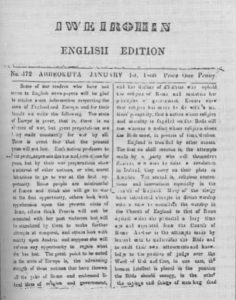
The Anglo-African
The Anglo-African was the second of newspaper established in Nigeria after Iwe Iroyin. It was founded on the 6th of June, 1863 by Robert Campbell, a printer and businessman. The newspaper appeared in English Language and was the first of its kind in Lagos.
Robert Campbell was a Jamaican businessman who had settled in Lagos with his family.
The period of arrival of the newspaper coincided with when Lagos was ceded to the British in 1861. It was also a period crowded with stories of inter-tribal wars and punitive expeditions by which the British suppressed the slave trade and established public law and order.
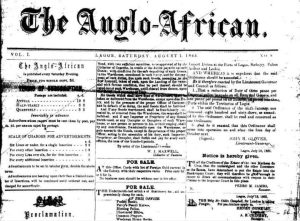
Lagos Times and Gold Coast Colony Advertiser
Lagos Times and Gold Coast Colony Advertiser was the third newspaper established in Nigeria. It succeeded Anglo African Newspapers and Iwe Iroyin. The newspaper was established on Wednesday, 10th of November, 1880 by Mr Richard Olamilege Beale Blaize and was edited by Mr Andrew M. Thomas and Mojola Agbebi. The 6 pence newspaper was printed fortnightly and was mainly concerned with the burning issues and matters of the period.
The newspaper was the first to decry the extravagance of the colonial government in one of its editions published in 1881. The Lagos Times and Gold Coast Colony Advertiser was harsh on many of the policies and actions of the colonial government of the time. The newspaper also criticized the executive and legislative council which had no African as one of its members.
The paper went out of circulation in October 1883, thought it reappeared 7years later but it wasn’t a success.
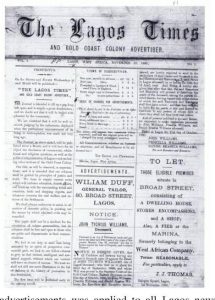
The Lagos Observer
The Lagos Observer, the fourth newspaper in Nigeria, was founded in Feb. 1882 by J. Bagan Benjamin, an African member of the Lagos Chamber of Commerce. The newspaper had the moral and financial support of Dr. N. T. King while Robert Campbell served as the chairman of the editorial committee.
The Lagos Observer was a fortnight newspaper sold for six pence per copy. Its printing & publishing office was located at Bishops Street, Lagos. The Lagos Observer beamed its searchlight on the social life of the people through its column “Tit-bit”, a column by which it exposed social and public evils.
The newspaper also advocated for social improvements like good roads and the building of markets. The Lagos Observer was actively involved in nationalist issues. According to Ayandele, “the paper’s view on these issues was radical and anti-imperialist“.
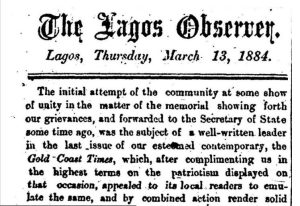
The West African Pilot
The West African Pilot was a newspaper launched in Nigeria by Nnandi Azikiwe in 1973, dedicated to fighting for independence from British colonial rule. It is most known for introducing popular journalism within Nigeria. The main focus of the newspaper was to promote Nigerian independence from colonial rule. Football was a topic often used within the media to promote these various arguments of independence. With humanistic language and powerful ideas, the West African Pilot successfully promoted the humanity of African workers in this colonised world.
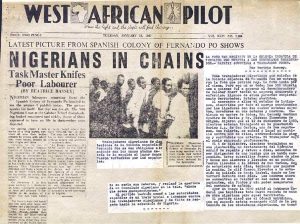


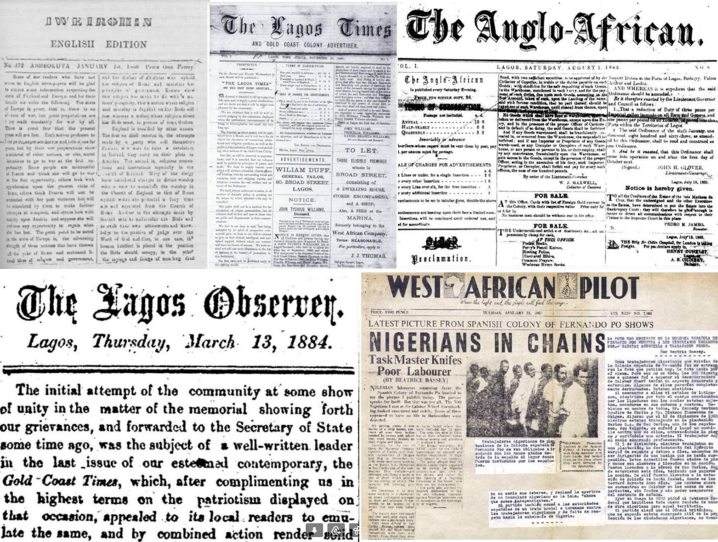



Comment
No comments found.